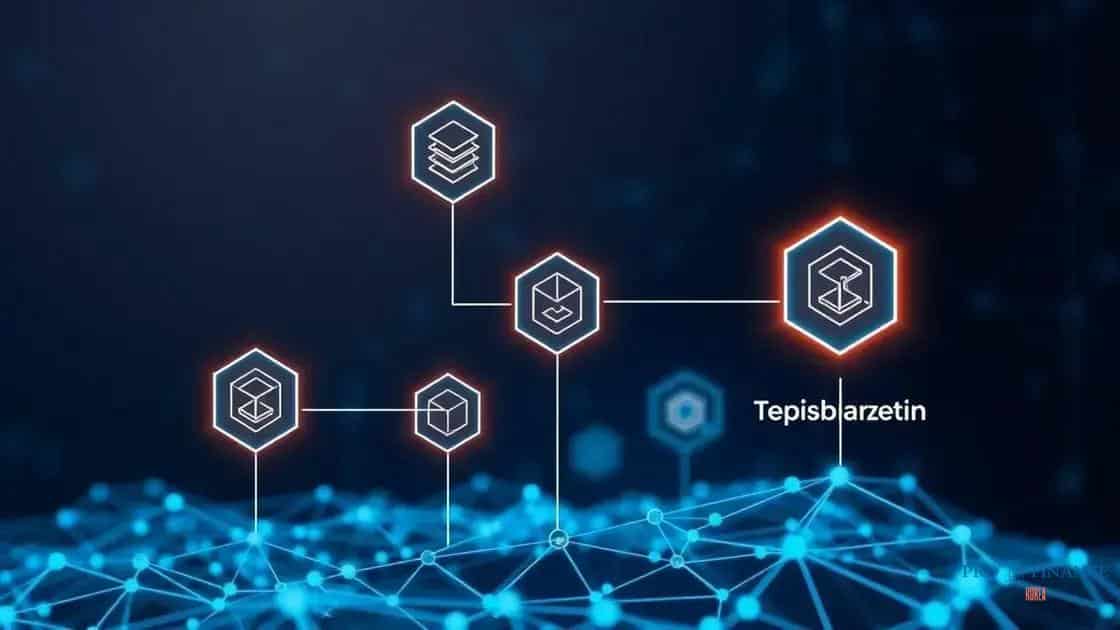The development of smart contracts using blockchain technology

The development of smart contracts using blockchain technology automates agreements securely, improving efficiency and reducing costs, but faces challenges like legal issues, security risks, and the need for specialized knowledge.
The development of smart contracts using blockchain technology is transforming how transactions and agreements are executed. They provide a reliable way to automate processes and enhance trust. But have you ever wondered how these systems work in practice?
Understanding smart contracts
Understanding smart contracts is crucial in grasping how blockchain technology functions. These are self-executing agreements with the terms directly written into code. Imagine a vending machine: you insert money, choose your item, and the machine automatically delivers it. This is similar to how smart contracts operate, eliminating the need for intermediaries.
How Smart Contracts Work
Smart contracts run on decentralized blockchain networks. This means that once deployed, they cannot be altered, which enhances security. The execution of these contracts occurs when predefined conditions are met. For example, in a real estate transaction, ownership transfers automatically once payment is confirmed.
Key Features of Smart Contracts
- Automation: Smart contracts execute automatically, saving time and reducing human error.
- Transparency: All transactions are recorded on the blockchain, visible to all parties involved.
- Security: The cryptographic nature of blockchain keeps contracts secure and tamper-proof.
- Cost-effective: By removing intermediaries, smart contracts can lower transaction costs.
With these features, smart contracts are becoming prominent in various industries. They’re used in finance, supply chain management, and even healthcare. The appeal lies in their ability to create trust and efficiency in transactions.
In conclusion, understanding smart contracts opens up a world of opportunities for innovation and collaboration. They represent a significant shift in how agreements are made, paving the way for a more automated future.
Key features of blockchain technology

Key features of blockchain technology are what make it a revolutionary tool in the digital age. This technology operates as a distributed ledger that ensures data integrity and transparency. Each transaction is recorded in a block and linked to the previous block, forming a chain. This unique structure enhances security and makes it difficult for anyone to alter past records.
Decentralization
One of the most significant features of blockchain technology is its decentralized nature. Unlike traditional systems that rely on a central authority, blockchain distributes data across a network of computers. This ensures that no single entity has control, reducing the risk of fraud and manipulation.
Immutability
- Secure transactions: Once a transaction is recorded on the blockchain, it cannot be changed.
- Data integrity: This feature enhances trust among users, as everyone can see the same transaction history.
- Historical accuracy: Immutability allows for a clear and verifiable record of all transactions.
The characteristics of blockchain make it particularly useful in finance, supply chain management, and health services. By utilizing blockchain technology, organizations can streamline processes and reduce costs.
Moreover, the transparency of blockchain promotes accountability. Every participant can verify transactions, which discourages malicious activities. Take, for instance, the banking sector; blockchain can automate complex transactions while ensuring compliance with regulations.
It’s clear that understanding the key features of blockchain technology is essential for businesses looking to innovate. As more industries embrace this technology, its impact on efficiency and security will continue to grow.
Use cases of smart contracts
Use cases of smart contracts illustrate how this technology can streamline various processes across multiple industries. Smart contracts enable automatic execution of agreements once predefined conditions are met. This capability reduces the need for intermediaries and enhances efficiency.
Financial Services
In the financial sector, smart contracts automate transactions and ensure compliance. For instance, they can be used in loan agreements where funds are released only when specific repayment conditions are met. This feature minimizes risks and improves trust between parties.
Supply Chain Management
In supply chain management, smart contracts enhance transparency and accountability. They allow all parties to access shared data, tracking the movement of goods in real-time. This reduces disputes and ensures that products meet quality standards before reaching consumers.
- Automated payments: Payment occurs automatically once goods are delivered and verified.
- Traceability: Each product’s journey can be tracked, ensuring authenticity.
- Cost reduction: Fewer intermediaries mean lower costs for businesses.
Healthcare is another area where smart contracts are making an impact. They can manage patient consent and data securely, allowing authorized personnel to access medical records without compromising security. This use case enhances patient privacy while improving care efficiency.
The growing adoption of smart contracts in real estate is also noteworthy. They facilitate property transactions by automating escrow processes and ensuring that funds are only transferred when all conditions are met. This not only speeds up transactions but also reduces fraud risk.
As we can see, the use cases of smart contracts are diverse and impactful. They are transforming traditional processes into faster, more reliable, and cost-effective solutions, paving the way for innovative changes in various sectors.
Steps to develop effective smart contracts
Steps to develop effective smart contracts involve several key phases that ensure functionality and security. First, it is vital to define the purpose of the contract clearly. Understanding the problem it aims to solve helps build a solid foundation for development.
Identify Requirements
Gather all necessary requirements from stakeholders. This includes legal considerations and specific conditions that need to be implemented within the contract. Clear communication with everyone involved ensures that all expectations are aligned.
Choose the Right Blockchain
Selecting the right blockchain is crucial. Different blockchains offer various features. Some are more suited for financial transactions, while others might be ideal for general-purpose applications. Research and choose one that fits your specific needs.
- Ethereum: Popular for its smart contract capabilities.
- Hyperledger: Good for private businesses.
- EOS: Known for fast transaction speeds.
After selecting the blockchain, the next step is to create the smart contract code. Use programming languages like Solidity for Ethereum or Chaincode for Hyperledger. Always code with security in mind to prevent vulnerabilities.
Next comes testing the contract. Conduct thorough tests in various scenarios to ensure it behaves as expected. Using test nets allows developers to simulate real-world interactions without financial risks. This step is vital to avoid costly mistakes once deployed.
Following testing, deploy the smart contract onto the selected blockchain. Once live, monitor its performance closely. Make adjustments if necessary, but remember that changes can be complex due to the immutable nature of the blockchain.
By following these steps, you can develop effective smart contracts that serve their intended purpose while maintaining security and efficiency. Each phase plays a vital role in the overall success of the smart contract development process.
Challenges in smart contract adoption
Challenges in smart contract adoption are significant hurdles that many organizations face today. While the technology offers great potential, understanding these challenges can help companies strategize for successful implementation. One major challenge is the complexity of development. Creating a smart contract requires specialized knowledge in programming and blockchain technology.
Legal and Regulatory Issues
Another challenge involves legal and regulatory frameworks. Many governments are still trying to understand how to regulate blockchain technology and smart contracts. Organizations must ensure compliance with existing laws, which can vary widely by region. This can lead to uncertainty and risk, making businesses hesitant to adopt the technology.
Security Concerns
Security is also a critical issue. Smart contracts are prone to bugs and vulnerabilities. If a contract is not coded correctly, it can lead to loss of funds or unauthorized access. Therefore, thorough testing and audits are necessary before deploying a contract.
- Bugs in code: Flaws can be exploited, leading to financial loss.
- Coding complexity: Developers must be skilled and experienced.
- Audit requirements: Continuous audits are essential for maintaining security.
Additionally, there is the challenge of user acceptance. Many potential users may lack the understanding or trust necessary to use smart contracts. Education and outreach are essential to help individuals and businesses see the benefits of adopting this technology.
Integration with existing systems can also be daunting. Organizations may struggle to incorporate smart contracts into their current operations smoothly. Ensuring compatibility with legacy systems can require significant time and resources.
Overall, while there are notable challenges in smart contract adoption, understanding these issues allows organizations to prepare and take advantage of the benefits that come with this innovative technology.
FAQ – Frequently Asked Questions about Smart Contracts
What are smart contracts?
Smart contracts are self-executing agreements with the terms written into code, allowing for automatic execution when conditions are met.
What are the main benefits of using smart contracts?
They increase efficiency, reduce costs by eliminating intermediaries, and enhance security through immutable records.
What challenges are associated with adopting smart contracts?
Challenges include legal and regulatory concerns, security risks, and the need for specialized knowledge for development.
How can companies prepare for integrating smart contracts?
Companies can prepare by understanding the technology, ensuring compliance with regulations, and investing in security measures.






